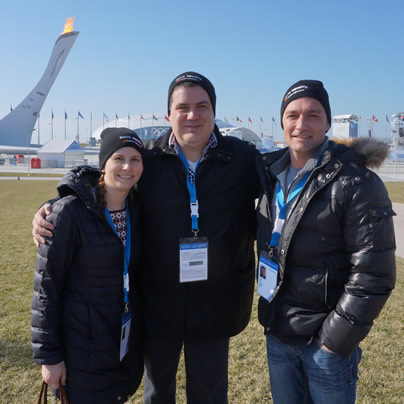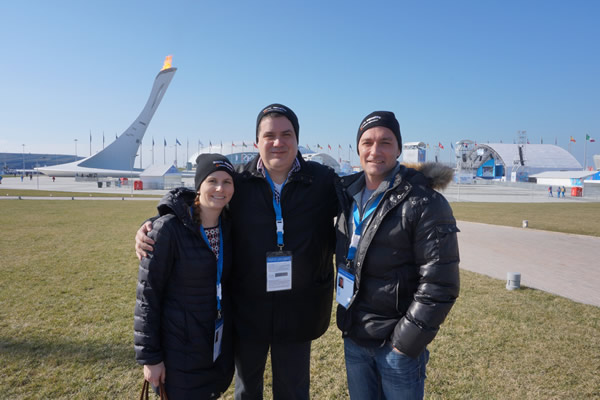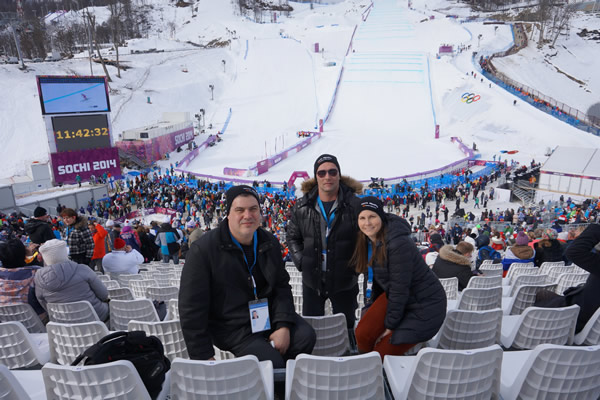National
Gay Olympian travels to Russia
David Pichler visited gay nightclub in Sochi


From left: Mary Elizabeth Margolis and Shawn Gaylord of Human Rights First and Olympian David Pichler in front of the Olympic torch in Sochi, Russia. (Photo courtesy of Human Rights First)
“We haven’t been to a lot of the different games where somebody might try to flash a symbol,” said David Pichler, a U.S. diver who competed in the 1996 Summer Olympics and 2000 Summer Olympics in Atlanta and Sydney during a telephone interview from the Black Sea resort city. “I imagine we would have heard if there had been something like that.”
Pichler and Shawn Gaylord and Mary Elizabeth Margolis of Human Rights First arrived in Sochi on Feb. 6.
The group visited a gay nightclub on Saturday where they met with Andrei Ozyorny, a 24-year-old man who wrote to Sochi Mayor Anatony Pakhomov last month after he said there are no gay people in the Black Sea resort city. Pichler, Gaylord and Margolis also attended the finals of the women’s slopestyle on Sunday where Jamie Anderson won a gold medal for the U.S.

From left; Shawn Gaylord of Human Rights First, Olympian David Pichler and Mary Elizabeth Margolis of Human Rights First at the finals of the women’s slopestyle in Rosa Khutor, Russia, on Feb. 9, 2014. (Photo courtesy of Human Rights First)
Pichler told the Blade that he, Gaylord and Margolis heard about an anti-LGBT protest that took place in Sochi before President Vladimir Putin and International Olympic Committee President Thomas Bach officially opened the games.
“[It] is kind of contradictory of the standards of the protest zone and everything that was set up,” said Pichler. “There was not anything negative or any type of action taken on them.”
Pichler told the Blade he had read about NBC’s decision to omit the portion of Bach’s speech during their broadcast of the opening ceremony in which he said it is possible for competitors “to live together under one roof in harmony, with tolerance and without any form of discrimination for whatever reason.” He said parts of the opening ceremony he saw on Russian television showed empty seats inside the stadium where it took place.
“It’s very disappointing to look around and see everyone coming out of the tunnel and seeing part of the stadium empty,” said Pichler. “That says a lot I think about the situation.”
Pichler spoke with the Blade on the same day that Hudson Taylor, founder of Athlete Ally, left Sochi where he had been highlighting efforts in support of adding sexual orientation to the Olympic charter’s anti-discrimination clause.
Pichler, Gaylord and Margolis met with Russian LGBT Network Chair Igor Kochetkov, Maria Kozlovskaya of “Coming Out” and Anastasia Smirnova in St. Petersburg on Feb. 6 before traveling to Sochi. St. Petersburg police the following day arrested Smirnova and three other LGBT rights advocates who tried to march over a bridge with a banner in support of adding gay-specific language to Principle 6 of the Olympic charter.
Police in Moscow arrested 10 LGBT rights activists who were singing the Russian national anthem in Red Square while holding rainbow and Russian flags just before the opening ceremony. Elena Kostynchenko told the Blade during an interview from the Russian capital on Saturday that officers threatened to sexually assault her and another female activist while in custody.
“It was interesting, just seeing what they’re going through and seeing how much they’ve taken on and how much they’ve had to deal with,” said Pichler as he discussed his meeting with Kochetkov, Kozlovskaya and Smirnova in St. Petersburg. “It’s impressive, and at the same time it’s very discouraging and very frightening to me to see what they have to go through.”
Putin told ABC News’ George Stephanopoulos last month those who protest his government’s LGBT rights record during the Olympics will not face prosecution under the country’s controversial law banning gay propaganda to minors that took effect last June. The IOC repeatedly said before the games that it had received assurances from the Kremlin that gays and lesbians will not suffer discrimination while in Sochi for the Olympics.
Gaylord said the St. Petersburg advocates told the group they recently saw police officers approach a woman in a subway station who looked “masculine in appearance, yelling things at her about the anti-propaganda law.”
Margolis told the Blade the Moscow Times last week published a short article about “how LGBT friendly the games were going to be.” She said the story also dismissed the international outcry over the Kremlin’s gay rights record ahead of the Olympics.
“Putin said it’s going to be very safe and we’re very excited to welcome all the athletes,” said Margolis, referring to the Moscow Times article. “It was just like a couple of paragraphs about it. It was real positive.”
Gaylord noted he did not see any LGBT-specific articles in the Russian newspapers he read during the group’s flight from the U.S. He told the Blade the only media reports he has seen about the St. Petersburg and Moscow arrests have been from American outlets.
Pichler added the group remains “kind of out of touch” because of the precautions he, Gaylord and Margolis have taken while in Sochi. These include not using Internet connections from computers that have Human Rights First and other personal information on them and purchasing temporary cell phones.
“We’re not getting to the information that we need to an extent because we haven’t had the resources since we came to Sochi,” said Pichler.
Pichler and Margolis are scheduled to return to the U.S. on Tuesday. Gaylord is scheduled to meet with Russian LGBT rights advocates in Moscow later this week before he travels back to D.C.
U.S. Supreme Court
Supreme Court to consider bans on trans athletes in school sports
27 states have passed laws limiting participation in athletics programs

The U.S. Supreme Court on Thursday agreed to hear two cases involving transgender youth challenging bans prohibiting them from participating in school sports.
In Little v. Hecox, plaintiffs represented by the ACLU, Legal Voice, and the law firm Cooley are challenging Idaho’s 2020 ban, which requires sex testing to adjudicate questions of an athlete’s eligibility.
The 9th U.S. Circuit Court of Appeals described the process in a 2023 decision halting the policy’s enforcement pending an outcome in the litigation. The “sex dispute verification process, whereby any individual can ‘dispute’ the sex of any female student athlete in the state of Idaho,” the court wrote, would “require her to undergo intrusive medical procedures to verify her sex, including gynecological exams.”
In West Virginia v. B.P.J., Lambda Legal, the ACLU, the ACLU of West Virginia, and Cooley are representing a trans middle school student challenging the Mountain State’s 2021 ban on trans athletes.
The plaintiff was participating in cross country when the law was passed, taking puberty blockers that would have significantly reduced the chances that she could have a physiological advantage over cisgender peers.
“Like any other educational program, school athletic programs should be accessible for everyone regardless of their sex or transgender status,” said Joshua Block, senior counsel for the ACLU’s LGBTQ and HIV Project. “Trans kids play sports for the same reasons their peers do — to learn perseverance, dedication, teamwork, and to simply have fun with their friends,” Block said.
He added, “Categorically excluding kids from school sports just because they are transgender will only make our schools less safe and more hurtful places for all youth. We believe the lower courts were right to block these discriminatory laws, and we will continue to defend the freedom of all kids to play.”
“Our client just wants to play sports with her friends and peers,” said Lambda Legal Senior Counsel Tara Borelli. “Everyone understands the value of participating in team athletics, for fitness, leadership, socialization, and myriad other benefits.”
Borelli continued, “The U.S. Court of Appeals for the Fourth Circuit last April issued a thoughtful and thorough ruling allowing B.P.J. to continue participating in track events. That well-reasoned decision should stand the test of time, and we stand ready to defend it.”
Shortly after taking control of both legislative chambers, Republican members of Congress tried — unsuccessfully — to pass a national ban like those now enforced in 27 states since 2020.
Federal Government
UPenn erases Lia Thomas’s records as part of settlement with White House
University agreed to ban trans women from women’s sports teams

In a settlement with the Trump-Vance administration announced on Tuesday, the University of Pennsylvania will ban transgender athletes from competing and erase swimming records set by transgender former student Lia Thomas.
The U.S. Department of Education’s Office for Civil Rights found the university in violation of Title IX, the federal rights law barring sex based discrimination in educational institutions, by “permitting males to compete in women’s intercollegiate athletics and to occupy women-only intimate facilities.”
The statement issued by University of Pennsylvania President J. Larry Jameson highlighted how the law’s interpretation was changed substantially under President Donald Trump’s second term.
“The Department of Education OCR investigated the participation of one transgender athlete on the women’s swimming team three years ago, during the 2021-2022 swim season,” he wrote. “At that time, Penn was in compliance with NCAA eligibility rules and Title IX as then interpreted.”
Jameson continued, “Penn has always followed — and continues to follow — Title IX and the applicable policy of the NCAA regarding transgender athletes. NCAA eligibility rules changed in February 2025 with Executive Orders 14168 and 14201 and Penn will continue to adhere to these new rules.”
Writing that “we acknowledge that some student-athletes were disadvantaged by these rules” in place while Thomas was allowed to compete, the university president added, “We recognize this and will apologize to those who experienced a competitive disadvantage or experienced anxiety because of the policies in effect at the time.”
“Today’s resolution agreement with UPenn is yet another example of the Trump effect in action,” Education Secretary Linda McMahon said in a statement. “Thanks to the leadership of President Trump, UPenn has agreed both to apologize for its past Title IX violations and to ensure that women’s sports are protected at the university for future generations of female athletes.”
Under former President Joe Biden, the department’s Office of Civil Rights sought to protect against anti-LGBTQ discrimination in education, bringing investigations and enforcement actions in cases where school officials might, for example, require trans students to use restrooms and facilities consistent with their birth sex or fail to respond to peer harassment over their gender identity.
Much of the legal reasoning behind the Biden-Harris administration’s positions extended from the 2020 U.S. Supreme Court case Bostock v. Clayton County, which found that sex-based discrimination includes that which is based on sexual orientation or gender identity under Title VII rules covering employment practices.
The Trump-Vance administration last week put the state of California on notice that its trans athlete policies were, or once were, in violation of Title IX, which comes amid the ongoing battle with Maine over the same issue.
New York
Two teens shot steps from Stonewall Inn after NYC Pride parade
One of the victims remains in critical condition

On Sunday night, following the annual NYC Pride March, two girls were shot in Sheridan Square, feet away from the historic Stonewall Inn.
According to an NYPD report, the two girls, aged 16 and 17, were shot around 10:15 p.m. as Pride festivities began to wind down. The 16-year-old was struck in the head and, according to police sources, is said to be in critical condition, while the 17-year-old was said to be in stable condition.
The Washington Blade confirmed with the NYPD the details from the police reports and learned no arrests had been made as of noon Monday.
The shooting took place in the Greenwich Village neighborhood of Manhattan, mere feet away from the most famous gay bar in the city — if not the world — the Stonewall Inn. Earlier that day, hundreds of thousands of people marched down Christopher Street to celebrate 55 years of LGBTQ people standing up for their rights.
In June 1969, after police raided the Stonewall Inn, members of the LGBTQ community pushed back, sparking what became known as the Stonewall riots. Over the course of two days, LGBTQ New Yorkers protested the discriminatory policing of queer spaces across the city and mobilized to speak out — and throw bottles if need be — at officers attempting to suppress their existence.
The following year, LGBTQ people returned to the Stonewall Inn and marched through the same streets where queer New Yorkers had been arrested, marking the first “Gay Pride March” in history and declaring that LGBTQ people were not going anywhere.
New York State Assemblywoman Deborah Glick, whose district includes Greenwich Village, took to social media to comment on the shooting.
“After decades of peaceful Pride celebrations — this year gun fire and two people shot near the Stonewall Inn is a reminder that gun violence is everywhere,” the lesbian lawmaker said on X. “Guns are a problem despite the NRA BS.”


















